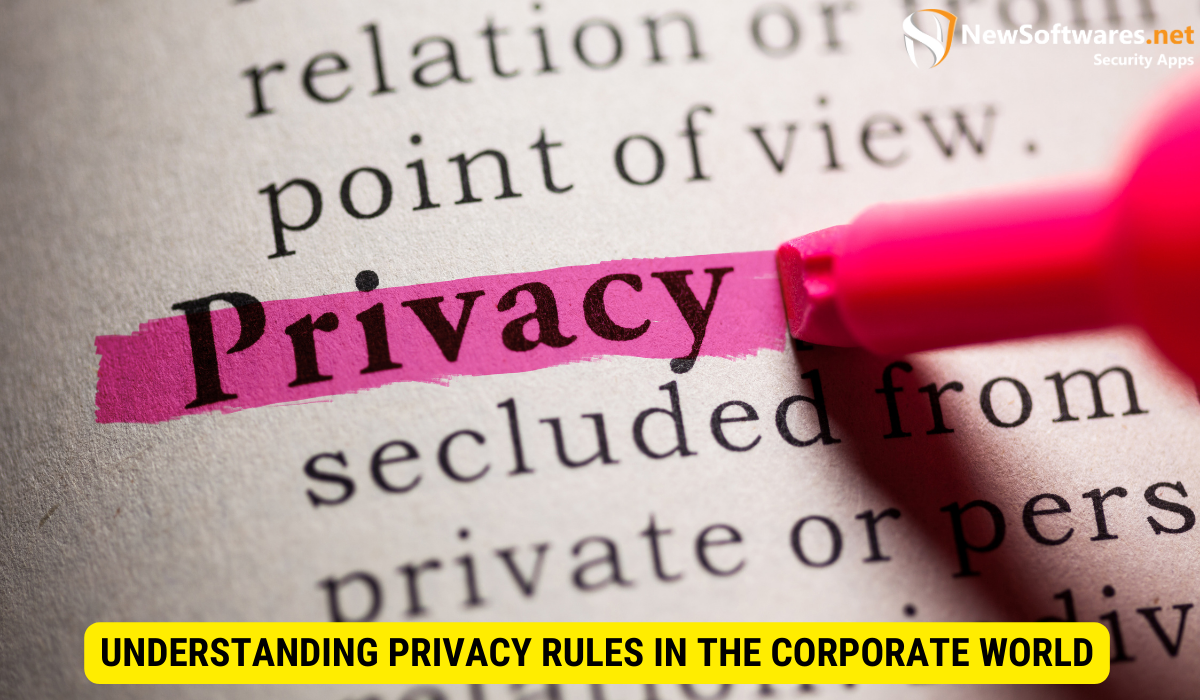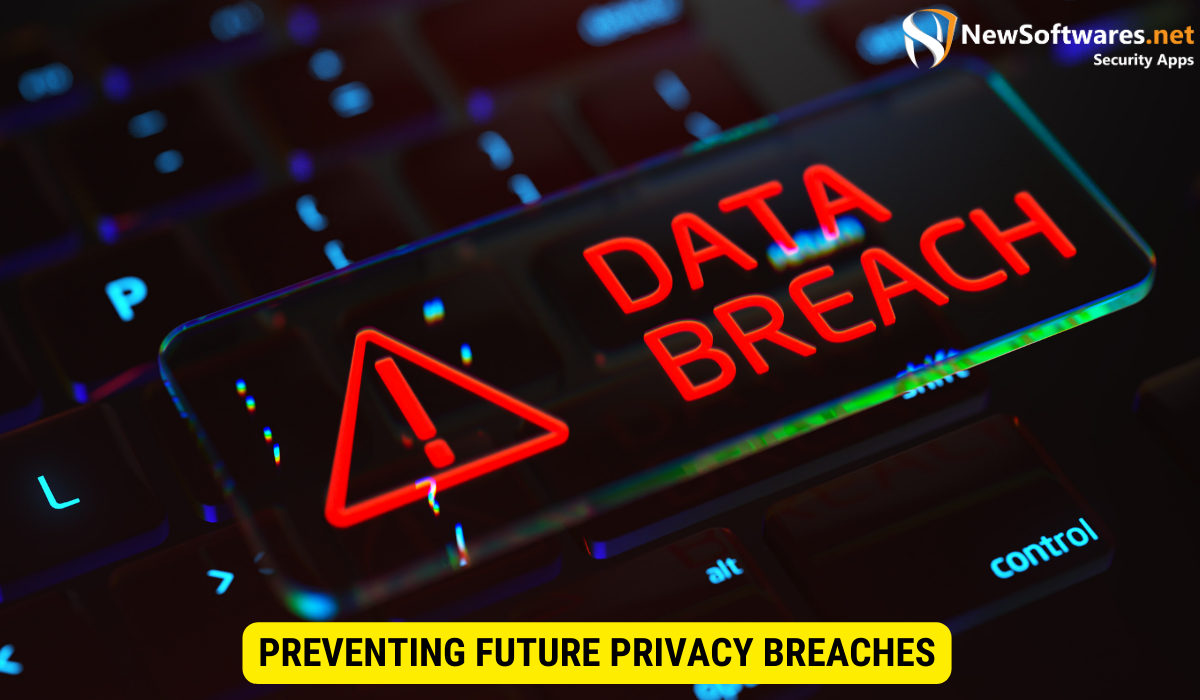The executives at Company E potentially breached privacy rules by sharing salary data without proper authorization, highlighting the critical importance of confidentiality and legal compliance in handling sensitive information within corporate environments.
“Executive at E” potentially violated privacy rules by sharing salary data. Together, we will delve into the concept of privacy rules in the corporate world, the importance of confidentiality in business, the legal implications of breaching privacy rules, the role of executives in upholding privacy, and the incident at E. Furthermore, we will evaluate the alleged privacy breach, discuss ways to prevent future incidents and provide key takeaways and replies to frequently asked questions.
Understanding Privacy Rules in the Corporate World

In a corporate environment, privacy rules are vital in protecting sensitive information. Privacy rules encompass regulations and internal policies that ensure confidentiality. These rules safeguard not only the personal data of employees and customers but also trade secrets and other proprietary information.
Organizations establish privacy rules to comply with legal requirements, build trust with stakeholders, and maintain a competitive edge by safeguarding valuable data. Employees, including executives, are responsible for understanding and following these rules to prevent privacy breaches.
Privacy rules are not only important for protecting personal and proprietary information, but they also contribute to the overall success and reputation of a company. By implementing strong privacy rules, organizations demonstrate their commitment to ethical business practices & gain the confidence of their employees, customers, and partners.
One aspect of privacy rules often emphasized in the corporate world is the importance of confidentiality. Confidentiality is a cornerstone of business ethics and is closely tied to privacy. It protects sensitive information from unauthorized access, disclosure, alteration, or destruction. Maintaining confidentiality fosters trust among employees, customers, and partners.
As leaders within an organization, executives must set an example by treating confidential information with utmost care. This includes safeguarding salary data, trade secrets, client lists, and any other information that could be harmful if exposed. By prioritizing confidentiality, executives protect the company’s interests and uphold their ethical responsibilities.
The legal implications of breaching privacy rules are a significant concern for individuals and organizations. Privacy breaches can result in severe legal consequences, which vary by jurisdiction. Civil and criminal penalties are common, and they may include hefty fines, lawsuits, reputational damage, and even imprisonment.
For example, if the executive at Company E shared salary data without proper authorization, they potentially violated privacy laws and could face legal action from affected employees. Additionally, Company E may be liable for not adequately safeguarding employee data. These legal implications highlight the importance of understanding and adhering to privacy rules in the corporate world.
The Role of an Executive in Upholding Privacy
Executives hold a significant responsibility in upholding privacy within an organization. They are entrusted with privileged information and are expected to act as guardians of confidentiality.
Privacy is a fundamental right that individuals expect and deserve. Executives ensure this right is protected and respected within their organizations. By doing so, they fulfill their legal obligations and foster an environment of trust and security.
Responsibilities of an Executive Regarding Confidential Information
Executives must familiarize themselves with privacy rules and keep abreast of changes or updates to applicable laws. This includes understanding the intricacies of data protection regulations, for instance the (GDPR) General Data Protection Regulation in the European Union or the (CCPA) California Consumer Privacy Act in the United States.
Furthermore, executives should champion the importance of privacy and confidentiality throughout the organization by ensuring proper policies and procedures. This involves working closely with legal and compliance teams to develop robust privacy frameworks that align with industry best practices.
Moreover, executives must lead by example, promoting a culture of trust and respect for privacy. They should emphasize the need for employees to obtain proper authorization before accessing or sharing sensitive information, including salary data. Executives can create a work environment where privacy is valued and protected by instilling a sense of responsibility and accountability.
Consequences of Privacy Breaches for Executives
Privacy breaches can have significant consequences for executives. In addition to potential legal action, a breach can tarnish an executive’s reputation, negatively impacting their career prospects. Trust from employees, stakeholders, and the public can be eroded, making it difficult to regain credibility.
Executives must understand the gravity of their roles and take appropriate measures to protect privacy. This includes implementing robust security measures, such as encryption and access controls, to safeguard sensitive information from unauthorized access or disclosure.
Furthermore, executives should invest in regular privacy training and employee awareness programs. By educating staff on the importance of privacy and the potential consequences of breaches, executives can empower their workforce to protect confidential information proactively.
Additionally, executives should establish a clear incident response plan to manage and mitigate privacy breaches effectively. This includes promptly notifying affected individuals, cooperating with regulatory authorities, and implementing remedial measures to prevent future incidents.
By prioritizing privacy and taking proactive measures, executives protect their organizations from legal and reputational risks and demonstrate their commitment to ethical business practices.
The Incident at E: A Detailed Overview
Let’s examine the incident at E that raised concerns about a potential breach of privacy rules. It was reported that an executive shared salary data without proper authorization, leaving many employees feeling their privacy had been violated.
The Information Shared and Its Impact
The executive at E purportedly disclosed sensitive salary data, providing individuals with unauthorized access to sensitive information of their colleagues. Such unauthorized disclosure can create a hostile work environment, strain employee relationships, and diminish organizational trust.
Furthermore, the impact of the breach extends beyond the immediate aftermath. Employees affected by the breach may experience increased stress and anxiety due to concerns about their privacy and the potential for discrimination or bias based on their salary information.
Immediate Reactions and Responses
Upon discovering the breach, E took immediate action to mitigate the damage and address the concerns of affected employees. The Human Resources department promptly launched an investigation to identify the extent of the privacy breach and hold accountable those responsible.
E’s executives apologized to affected employees, regretting the breach and reaffirming the organization’s commitment to privacy. Additionally, they implemented measures to prevent similar incidents from occurring in the future.
Evaluating the Alleged Privacy Breach at E
Let’s evaluate the alleged privacy breach at E to assess its severity and potential consequences.
Assessing the Severity of the Breach
The severity of a privacy breach depends on various factors, such as the nature of the information disclosed, the number of individuals affected, and the intent behind the disclosure. In the case of E, the unauthorized sharing of salary data impacted numerous employees and potentially violated privacy laws.
Evaluating the severity of the breach requires considering the potential harm caused to individuals and the organization’s response to rectify the situation. It is crucial to thoroughly investigate the incident and take appropriate actions to prevent similar breaches in the future.
Potential Legal and Ethical Consequences
Legal and ethical consequences may ensue if the allegations against the executive at E are substantiated. E could face legal repercussions, including fines and lawsuits, for not adequately protecting employees’ privacy.
From an ethical standpoint, the breach may lead to questions surrounding E’s commitment to confidentiality and employee trust. E must implement comprehensive privacy policies, reinforce ethical standards, and rebuild trust with affected employees.
Preventing Future Privacy Breaches

Organizations must adopt robust privacy protection measures to prevent future privacy breaches and foster a culture of privacy and confidentiality.
Implementing Stronger Privacy Policies
Organizations, including E, should review and strengthen their privacy policies to ensure they align with legal requirements and best practices. Policies must encompass the protection of sensitive information, clearly outline employee responsibilities, and provide guidelines for obtaining proper authorization before accessing or sharing data.
Regular policy reviews, employee training, and periodic audits can help reinforce and update privacy policies, ensuring compliance and reducing the risk of privacy breaches.
Training and Awareness Programs for Employees
Employee training and awareness programs are critical in preventing privacy breaches. All employees, including executives, should receive comprehensive training on privacy rules, legal obligations, and the potential consequences of breaching privacy.
Training should emphasize the significance of obtaining proper authorization and the importance of confidentiality. Through ongoing education and awareness, employees can become vigilant guardians of privacy, protecting sensitive information.
Key Takeaways
- Privacy rules in the corporate world protect sensitive information, trade secrets, and personal data.
- Confidentiality is crucial in business for building trust and protecting proprietary information.
- Privacy breaches can have severe legal and reputational consequences.
- Executives have a responsibility to uphold privacy and foster a culture of confidentiality.
- The incident at E highlights the potential consequences of sharing salary data without proper authorization.
- Evaluating the severity of a breach and implementing preventive measures are essential.
- Strong privacy policies and comprehensive employee training can help prevent future breaches.
FAQs
Q: Can an executive be held responsible for a privacy breach even if they were not directly involved?
A: Executives can be held responsible for a privacy breach even if they were not directly involved. As leaders within an organization, executives must ensure compliance with privacy rules and take appropriate measures to prevent breaches.
Q: What actions should an organization take in response to a privacy breach?
A: In response to a privacy breach, organizations should take swift action to investigate and contain the breach. They must inform affected individuals, implement measures to prevent further breaches and cooperate with relevant authorities. Transparency, accountability, and steps to rectify the situation are crucial to rebuilding trust.
Q: How can employees contribute to preventing privacy breaches?
A: Employees can contribute to preventing privacy breaches by familiarizing themselves with privacy policies, obtaining proper authorization before accessing or sharing sensitive information, and promptly reporting any potential breaches. All employees need to prioritize privacy and maintain confidentiality.
Conclusion
In conclusion, sharing salary data without proper authorization can potentially violate privacy rules in the corporate world. Executives have a vital role in upholding privacy, ensuring the confidentiality of sensitive information, and fostering a culture of trust and respect for privacy. The incident at E serves as a reminder of the legal and ethical consequences of privacy breaches. Organizations can prevent future breaches and protect valuable data by implementing more robust privacy policies and providing comprehensive training programs.
